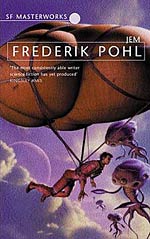
![]() Sable Aradia
Sable Aradia
6/28/2019
![]()
Read for the Science Fiction Masterworks Book Club.
This book was absorbing, interesting, and kept me picking it up to see what would happen next. It was also joyless, cynical, and depressing in a way that makes A Song of Ice and Fire seem hopeful and cheery. The most sympathetic character is an alien with a natural hydrogen balloon making up most of his body. So don't read it if, for you, a story is something happening to someone you care about, because you will be deeply disappointed.
On the other hand, this book is a scathing criticism of the Cold War and Colonialism. It is sometimes said that science fiction allows us to take issues that are difficult or controversial in the real world, and examine them with some distance. The distance here, despite the weird alien species that feature as metaphors for Indigenous peoples under Colonialism, is as thin as rice paper.
Maybe that was intentional. In 1979, when the book was published, the United States was still blithely full of its own self-importance, believing itself the pinnacle of freedom and righteousness, while in the meantime, American Colonialism was well underway and the Cold War seemed to be eternal. Perhaps Pohl was delivering a solid bitch slap to American exceptionalism.
The plot: the world has divided itself up into three power blocs that are rich in one resource and poor in all others. There is the Food Bloc, the Fuel Bloc, and the People Bloc. I failed to understand the People Bloc or how its "resources" worked; Pohl made it sound like this was the bloc with the most non-white people in it, and that their main resource was contributing labour for the other blocs. I think it was intended as a foil to represent the Communist Bloc as it existed in the 70s, with all his American prejudices showing, even as he criticized America's attitude of "war for war's sake, because patriotism."
But anyway, the blocs all compete with each other for political supremacy, since they can't war with each other for risk of blowing up the world in a massive nuclear holocaust. Then they discover a distant world that might be colonizable, and it features three sentient species already on it.
A new Space Race begins to be the first to get to the planet, and exploit its resources, before the other blocs can do so. A rather amusing parallel to the effects of malaria on the Europeans is explored by severe allergic reactions to the native flora of the new planet, although of course the Commun- er, I mean, the People Bloc, is the first to encounter this issue and suffer the results of it, which sets back their population, and thus, available resources, for the entire length of the colonization process.
Each bloc either befriends, or enslaves, although all exploit, one of the sentient races already present on the planet eventually known as Jem. Eventually the competition degenerates into a proxy war. In the meantime, back on Earth, knowing that the human race now exists somewhere else as well as our little rock, the leaders of the blocs feel free to get more violent with one another, as they, too, compete for the resources of "pristine, untouched" Jem. It's England, France and Spain fighting each other for control of their colonies... or America, China and the Soviet Union competing for control of the other "Capitalist" or "Communist" countries... or America, China and the Middle East competing for control of Earth's dwindling resources...
The end result is just about as grim as you might expect. Although the humans left on Jem are quite happy in their "utopia" (the subtitle of the book is "The Making of a Utopia") though the much-reduced indigenous sentients of Jem are perhaps not as happy (please note: this is intended as ironic understatement). Which brings up another point: is "utopia" only possible through the subjugation and exploitation of other groups? I would personally like to believe that we can eventually grow beyond that.
I read this book in a fevered page-turning frenzy over a couple of days, but it was a bit like watching, horrified, as a ten-car pileup starts on the highway. You keep reading because you're unable to turn away.
A good book to make you think, but you don't know what to think afterwards, or feel. I imagine the aftermath of drunken one-night stand might feel like this, especially if the sex were amazing but you never would have had sex with that person sober. I felt like this the first (and last) time I got really, really drunk. I had an amazing time, and I remember singing and laughing and cheering, surrounded by friends... but I lost a good part of the night after a point, and I woke up feeling like someone had been beating my head with a brick, exhausted and sicker than a dog. I never drank like that again. And I'll approach Pohl with more caution in the future.
http://www.dianemorrisonfiction.com